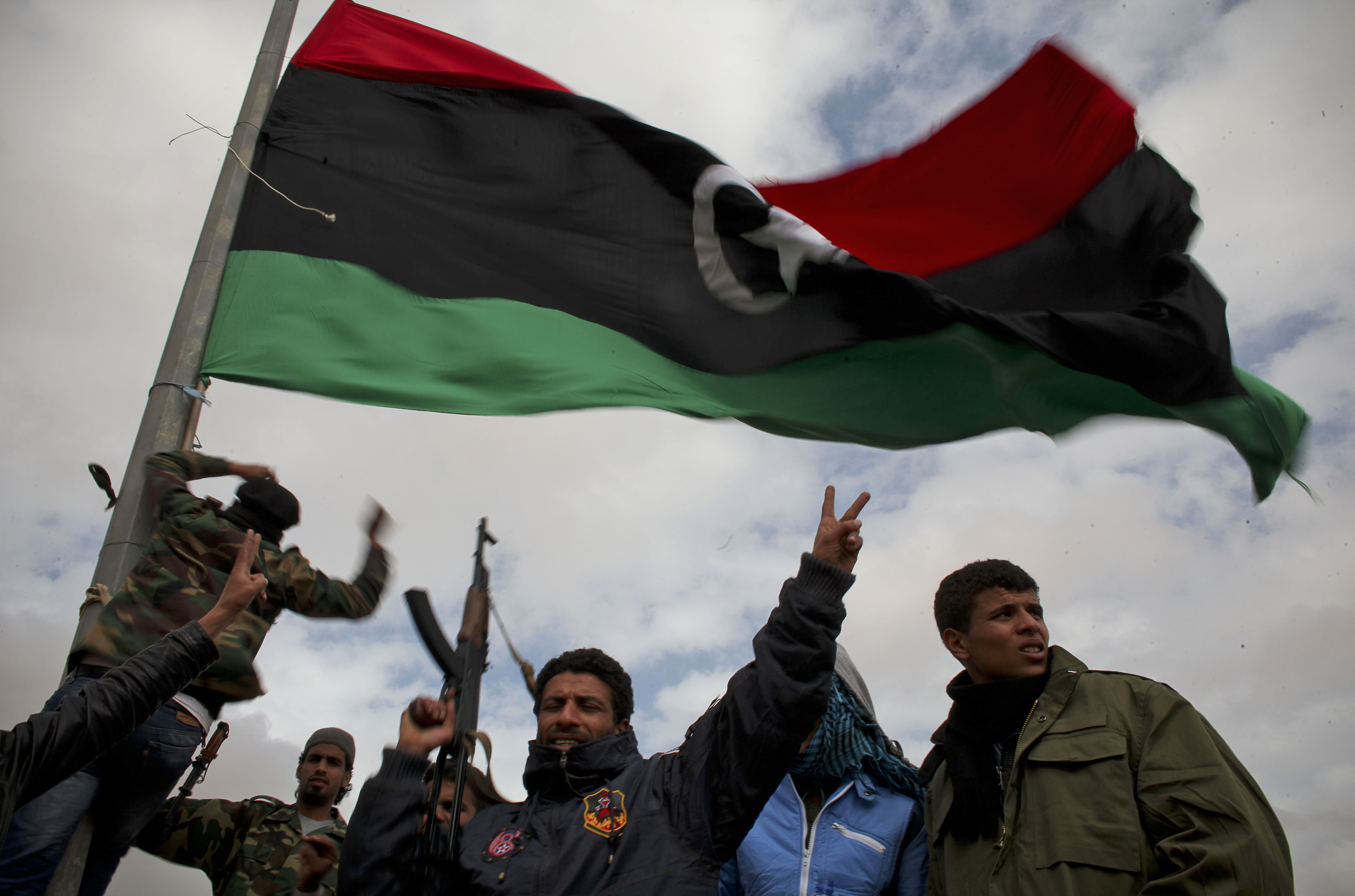 Libyan volunteers gesture as they raise a pre Gadhafi flag on the outskirts of the eastern town of Ras Lanouf, Libya, Tuesday, March 8, 2011. Forces loyal to Moammar Gadhafi have scored a significant victory, recapturing the closest city to the capital to have fallen in rebel hands. On another front near the opposition-held east, loyalists trying to stop anti-government fighters from advancing toward the capital pounded the rebels with airstrikes and rockets. (AP Photo/Tara Todras-Whitehill)
Libyan volunteers gesture as they raise a pre Gadhafi flag on the outskirts of the eastern town of Ras Lanouf, Libya, Tuesday, March 8, 2011. Forces loyal to Moammar Gadhafi have scored a significant victory, recapturing the closest city to the capital to have fallen in rebel hands. On another front near the opposition-held east, loyalists trying to stop anti-government fighters from advancing toward the capital pounded the rebels with airstrikes and rockets. (AP Photo/Tara Todras-Whitehill)If anything can put the political partisanship and incivility in Washington in perspective, it's the violence attached to the rebellion in Libya and the spreading insurrection in Syria. In both, the courage of protesters who are trying to unseat the long entrenched and harshly authoritarian regimes are inspiring. In both, the challenges ordinary people face in their effort to overturn the oppressive political regimes that have strait-jacketed their lives and liberties makes our capital's routine political jockeying seem myopic and small bore.
The foment in Libya, where untrained rebels with light arms have been going up against dictator Muammar Gadhafi's tanks and artillery, has had substantially more coverage. It began earlier, on the heels of the relatively peaceful protests in Tunisia and Egypt, and the intervention of the United States in league with NATO has allowed access to more media and in-depth reporting.
And though Adm. Mike Mullen, the chairman of the Joint Chiefs of Staff, acknowledged last Friday that a stalemate now seems possible, or perhaps likely, there remains hope that NATO aid and training will ultimately help the rebels oust the Gadhafi regime.
Circumstances in Syria, Iran's key ally in the Middle East, are far more unbalanced than in Libya and apparently more dire. President Bashar al-Assad, who assumed his father's autocratic position 11 years ago, had been pivoting between the use of force and making political compromises - such as lifting a 40-year state of emergency that allowed arrests and detention without hearings. But over the weekend, he seemed to dismiss opportunities for reform and conciliation altogether, and to embrace force as the chief tactic to suppress the country's deepening crisis, as his father once did.
The shift was evident Friday, when security forces turned on thousands of demonstrators leaving noon prayers, firing rapid rounds of live ammunition and killing at least 81 in what was termed by a New York Times report as the bloodiest day yet in the five-week-old uprising. By Sunday, the week's death toll among protesters had reached at least 120. That brought the tally of the dead to more than 400 deaths and an untold number of wounded since police started firing on unarmed demonstrators.
The demonstrations began in Dara following arrests of a group of high school students who had drawn anti-regime graffiti. They had quickly spread into nearly 20 towns and cities across the country, and had grown in intensity after police began firing on funeral processions honoring the victims of earlier rounds of unprovoked killings.
Bashar's grim crackdown took a new turn Monday when the Syrian Army, taking over from police, stormed into Dara with tanks and possibly thousands of troops, who began arresting and firing on demonstrators and taking known activists from their homes. The operation recalled the 1982 military campaign in Hama - ordered by Hafez al-Assad's, the father of the current president - that crushed a six-year-long Islamic uprising by the Sunni-dominated Muslim Brotherhood and killed more than 10,000. Estimates of the dead, in fact, ran up to 40,000, the number estimated by the Syrian Human Rights Commission.
Until this weekend, Bashar al-Assad had seemed to be considering robust political reforms that would help steer his country toward a pluralistic government and a more prosperous, open future. Had he pursued that course, his minority Alawite sect might have earned some goodwill. If he follows the course of violence, his family and his sect will remain as objects of more hatred from the majority Sunnis who have chafed under Assad rule.
The United Nations will consider today whether and how to sanction Syria for its violence. But its people already know how they wish the violence would end: with regime change. Democratic reforms now will not be enough. Unlike Libya's rebels, however, Syrians will have no overt western aid. They will be left to earn regime change on their own.